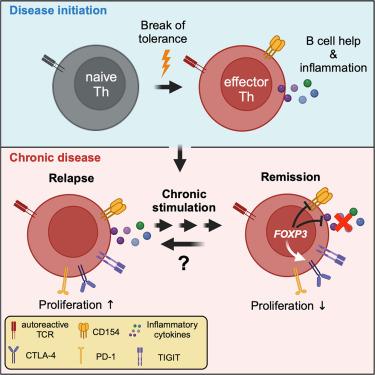Our official English website, www.x-mol.net, welcomes your
feedback! (Note: you will need to create a separate account there.)
Autoantigen-specific CD4+ T cells acquire an exhausted phenotype and persist in human antigen-specific autoimmune diseases
Immunity ( IF 25.5 ) Pub Date : 2024-09-02 , DOI: 10.1016/j.immuni.2024.08.005 Carina Saggau 1 , Petra Bacher 2 , Daniela Esser 3 , Mahdi Rasa 4 , Silja Meise 1 , Nicola Mohr 1 , Nora Kohlstedt 1 , Andreas Hutloff 2 , Sarah-Sophie Schacht 1 , Justina Dargvainiene 3 , Gabriela Rios Martini 2 , Klarissa H Stürner 5 , Ina Schröder 3 , Robert Markewitz 3 , Johannes Hartl 6 , Maria Hastermann 7 , Ankelien Duchow 7 , Patrick Schindler 7 , Mareike Becker 8 , Carolin Bautista 9 , Judith Gottfreund 10 , Jörn Walter 10 , Julia K Polansky 11 , Mingxing Yang 12 , Reza Naghavian 13 , Mareike Wendorff 14 , Ev-Marie Schuster 15 , Andreas Dahl 16 , Andreas Petzold 16 , Susanne Reinhardt 16 , Andre Franke 17 , Marek Wieczorek 18 , Lea Henschel 18 , Daniel Berger 18 , Guido Heine 19 , Maike Holtsche 20 , Vivien Häußler 21 , Christian Peters 1 , Enno Schmidt 20 , Simon Fillatreau 22 , Dirk H Busch 23 , Klaus-Peter Wandinger 3 , Kilian Schober 24 , Roland Martin 25 , Friedemann Paul 7 , Frank Leypoldt 5 , Alexander Scheffold 1
Immunity ( IF 25.5 ) Pub Date : 2024-09-02 , DOI: 10.1016/j.immuni.2024.08.005 Carina Saggau 1 , Petra Bacher 2 , Daniela Esser 3 , Mahdi Rasa 4 , Silja Meise 1 , Nicola Mohr 1 , Nora Kohlstedt 1 , Andreas Hutloff 2 , Sarah-Sophie Schacht 1 , Justina Dargvainiene 3 , Gabriela Rios Martini 2 , Klarissa H Stürner 5 , Ina Schröder 3 , Robert Markewitz 3 , Johannes Hartl 6 , Maria Hastermann 7 , Ankelien Duchow 7 , Patrick Schindler 7 , Mareike Becker 8 , Carolin Bautista 9 , Judith Gottfreund 10 , Jörn Walter 10 , Julia K Polansky 11 , Mingxing Yang 12 , Reza Naghavian 13 , Mareike Wendorff 14 , Ev-Marie Schuster 15 , Andreas Dahl 16 , Andreas Petzold 16 , Susanne Reinhardt 16 , Andre Franke 17 , Marek Wieczorek 18 , Lea Henschel 18 , Daniel Berger 18 , Guido Heine 19 , Maike Holtsche 20 , Vivien Häußler 21 , Christian Peters 1 , Enno Schmidt 20 , Simon Fillatreau 22 , Dirk H Busch 23 , Klaus-Peter Wandinger 3 , Kilian Schober 24 , Roland Martin 25 , Friedemann Paul 7 , Frank Leypoldt 5 , Alexander Scheffold 1
Affiliation

|
Pro-inflammatory autoantigen-specific CD4+ T helper (auto-Th) cells are central orchestrators of autoimmune diseases (AIDs). We aimed to characterize these cells in human AIDs with defined autoantigens by combining human leukocyte antigen (HLA)-tetramer-based and activation-based multidimensional ex vivo analyses. In aquaporin4-antibody-positive neuromyelitis optica spectrum disorder (AQP4-NMOSD) patients, auto-Th cells expressed CD154, but proliferative capacity and pro-inflammatory cytokines were strongly reduced. Instead, exhaustion-associated co-inhibitory receptors were expressed together with FOXP3, the canonical regulatory T cell (Treg) transcription factor. Auto-Th cells responded in vitro to checkpoint inhibition and provided potent B cell help. Cells with the same exhaustion-like (ThEx) phenotype were identified in soluble liver antigen (SLA)-antibody-autoimmune hepatitis and BP180-antibody-positive bullous pemphigoid, AIDs of the liver and skin, respectively. While originally described in cancer and chronic infection, our data point to T cell exhaustion as a common mechanism of adaptation to chronic (self-)stimulation across AID types and link exhausted CD4+ T cells to humoral autoimmune responses, with implications for therapeutic targeting.
中文翻译:

自身抗原特异性 CD4+ T 细胞获得耗竭的表型,并在人类抗原特异性自身免疫性疾病中持续存在
促炎性自身抗原特异性 CD4+ 辅助性 T 细胞 (自身Th) 细胞是自身免疫性疾病 (AIDs) 的中心协调器。我们旨在通过结合基于人类白细胞抗原 (HLA) -四聚体和基于活化的多维离 体分析来表征具有明确自身抗原的人类 AIDS 中的这些细胞。在水通道蛋白 4 抗体阳性视神经脊髓炎谱系疾病 (AQP4-NMOSD) 患者中,自身 Th 细胞表达 CD154,但增殖能力和促炎细胞因子强烈降低。相反,耗竭相关的共抑制受体与经典调节性 T 细胞 (Treg) 转录因子 FOXP3 一起表达。自身 Th 细胞在 体外对检查点抑制做出反应,并提供有效的 B 细胞帮助。在肝脏和皮肤的可溶性肝抗原 (SLA) - 抗体 - 自身免疫性肝炎和 BP180 抗体阳性大疱性类天疱疮、艾滋病中分别鉴定出具有相同耗竭样 (ThEx) 表型的细胞。虽然最初在癌症和慢性感染中描述,但我们的数据表明 T 细胞耗竭是适应 AID 类型慢性(自我)刺激的常见机制,并将耗竭的 CD4+ T 细胞与体液自身免疫反应联系起来,对治疗靶向有影响。
更新日期:2024-09-02
中文翻译:

自身抗原特异性 CD4+ T 细胞获得耗竭的表型,并在人类抗原特异性自身免疫性疾病中持续存在
促炎性自身抗原特异性 CD4+ 辅助性 T 细胞 (自身Th) 细胞是自身免疫性疾病 (AIDs) 的中心协调器。我们旨在通过结合基于人类白细胞抗原 (HLA) -四聚体和基于活化的多维离 体分析来表征具有明确自身抗原的人类 AIDS 中的这些细胞。在水通道蛋白 4 抗体阳性视神经脊髓炎谱系疾病 (AQP4-NMOSD) 患者中,自身 Th 细胞表达 CD154,但增殖能力和促炎细胞因子强烈降低。相反,耗竭相关的共抑制受体与经典调节性 T 细胞 (Treg) 转录因子 FOXP3 一起表达。自身 Th 细胞在 体外对检查点抑制做出反应,并提供有效的 B 细胞帮助。在肝脏和皮肤的可溶性肝抗原 (SLA) - 抗体 - 自身免疫性肝炎和 BP180 抗体阳性大疱性类天疱疮、艾滋病中分别鉴定出具有相同耗竭样 (ThEx) 表型的细胞。虽然最初在癌症和慢性感染中描述,但我们的数据表明 T 细胞耗竭是适应 AID 类型慢性(自我)刺激的常见机制,并将耗竭的 CD4+ T 细胞与体液自身免疫反应联系起来,对治疗靶向有影响。


















































 京公网安备 11010802027423号
京公网安备 11010802027423号